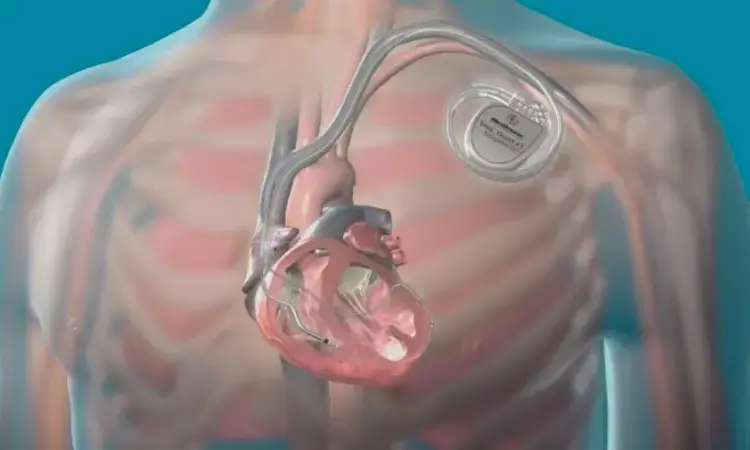- Home
- Medical news & Guidelines
- Anesthesiology
- Cardiology and CTVS
- Critical Care
- Dentistry
- Dermatology
- Diabetes and Endocrinology
- ENT
- Gastroenterology
- Medicine
- Nephrology
- Neurology
- Obstretics-Gynaecology
- Oncology
- Ophthalmology
- Orthopaedics
- Pediatrics-Neonatology
- Psychiatry
- Pulmonology
- Radiology
- Surgery
- Urology
- Laboratory Medicine
- Diet
- Nursing
- Paramedical
- Physiotherapy
- Health news
- Fact Check
- Bone Health Fact Check
- Brain Health Fact Check
- Cancer Related Fact Check
- Child Care Fact Check
- Dental and oral health fact check
- Diabetes and metabolic health fact check
- Diet and Nutrition Fact Check
- Eye and ENT Care Fact Check
- Fitness fact check
- Gut health fact check
- Heart health fact check
- Kidney health fact check
- Medical education fact check
- Men's health fact check
- Respiratory fact check
- Skin and hair care fact check
- Vaccine and Immunization fact check
- Women's health fact check
- AYUSH
- State News
- Andaman and Nicobar Islands
- Andhra Pradesh
- Arunachal Pradesh
- Assam
- Bihar
- Chandigarh
- Chattisgarh
- Dadra and Nagar Haveli
- Daman and Diu
- Delhi
- Goa
- Gujarat
- Haryana
- Himachal Pradesh
- Jammu & Kashmir
- Jharkhand
- Karnataka
- Kerala
- Ladakh
- Lakshadweep
- Madhya Pradesh
- Maharashtra
- Manipur
- Meghalaya
- Mizoram
- Nagaland
- Odisha
- Puducherry
- Punjab
- Rajasthan
- Sikkim
- Tamil Nadu
- Telangana
- Tripura
- Uttar Pradesh
- Uttrakhand
- West Bengal
- Medical Education
- Industry
ICD Implantation Does Not Increase Serious Car Crash Risk, Study Finds

Researchers have found in a new study that receiving an implantable cardioverter-defibrillator (ICD) within the last six months does not increase the risk of serious motor vehicle accidents. The findings published in JACC: Clinical Electrophysiology indicated that patients who had recently received an ICD were not at a significantly increased risk of subsequent crashes or being found responsible for accidents. The study was conducted by John A. S. and colleagues in Canada.
The mechanism of an ICD is to prevent sudden cardiac death by delivering shocks when life-threatening arrhythmias occur. In contrast, early periods after implantation increase the incidence of ventricular arrhythmias, inappropriate shocks, and device-related complications such as lead dislodgement. In case such events occur while the patient is driving, they might imply contributing accidents.
Due to these risks, driving restrictions are usually in place for several months after ICD implantation. Patients receiving an ICD for secondary prevention, like those with a prior history of cardiac arrest or sustained ventricular arrhythmia, may experience longer restrictions up to six months. Previous research studies examining crash risk in ICD recipients have had methodological limitations that have made it difficult to derive strong evidence-based driving recommendations.
The study analyzed data from 1997 to 2019, identifying all drivers involved in serious motor vehicle accidents and those who had an ICD implanted within the preceding six months. A case-crossover analysis was performed on 2,595 drivers (median age 66 years; 85% men) involved in 3,299 crashes during the study period.
To assess potential crash risk differences, the authors compared the percentage of ICD implantations within the pre-crash intervals (6.4%) to those without accident control intervals (7.4%). In another analysis, responsibility for crashes was assessed to see if the recipients of the ICD were at a greater chance of being at fault compared to drivers with no ICD.
Results
• No association of significance was found between ICD implantation and the risk of crashing: ICD implantation occurred in 6.4% of pre-crash intervals and in 7.4% of control intervals, suggesting that no increased risk of crashing exists (adjusted OR 0.86; 95% CI 0.71-1.03).
• Crash Tendency towards responsibility showed a numerical but nonsignificant increase: Among 22 ICD recipients who experienced crashes, 14 (64%) were attributed with responsibility as compared with 532,741 of 1,035,433 (51%) drivers not holding an ICD. With the adjusted odds ratio showing the possibility of a rise in tendency towards responsibility OR 2.20; 95% CI 0.94-5.30), the result failed to reach the level of significance.
The study authors concluded that while there appears to be no increased risk of serious motor vehicle accidents from ICD implantation within the last six months, some uncertainty remains regarding crash responsibility. Patients and healthcare providers should also continue to be educated and made aware regarding driving safety post-ICD implantation, ensuring that any policy changes are based on robust scientific evidence.
Reference:
Staples, J. A., Daly-Grafstein, D., Robinson, I., Khan, M., Hawkins, N. M., Chan, H., Erdelyi, S., Steinberg, C., Maclure, K. M., Krahn, A. D., & Brubacher, J. R. (2025). Cardioverter-defibrillator implantation as a risk factor for motor vehicle crash. JACC. Clinical Electrophysiology.https://doi.org/10.1016/j.jacep.2024.12.002
Dr Riya Dave has completed dentistry from Gujarat University in 2022. She is a dentist and accomplished medical and scientific writer known for her commitment to bridging the gap between clinical expertise and accessible healthcare information. She has been actively involved in writing blogs related to health and wellness.
Dr Kamal Kant Kohli-MBBS, DTCD- a chest specialist with more than 30 years of practice and a flair for writing clinical articles, Dr Kamal Kant Kohli joined Medical Dialogues as a Chief Editor of Medical News. Besides writing articles, as an editor, he proofreads and verifies all the medical content published on Medical Dialogues including those coming from journals, studies,medical conferences,guidelines etc. Email: drkohli@medicaldialogues.in. Contact no. 011-43720751


